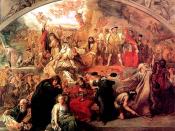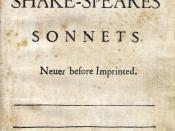Shakespeare's Sonnet 19
In his Sonnet 19, Shakespeare
presents the timeless theme of Time's mutability. As the lover apostrophizes
Time, one might expect him to address 'old Time' as inconstant, for
such an epithet implies time's changeability. But inconstant also suggests
capricious, and the lover finds time more grave than whimsical in its alterations.
With the epithet 'devouring' he addresses a greedy, ravenous
hunger, a Time that is wastefully destructive.
Conceding to Time its wrongs, the lover at first appears to encourage Time to
satisfy its insatiable appetite. Indeed, he familiarly addresses Time as
'thou' as he commands it harshely to 'blunt, n 'make the
earth devour, n 'pLuck,' and 'burn.' Not onLy are the
verbs 'blunt,n npluck,' and 'burn' linked by assonance,
but also by their plosive initial consonants, so that the Lover's orders sound off
Time's destructiveness as well. Each line offers a different image of Time at
work: on the lion, the earth, the tiger, the phoenix-bird.
Time is indiscriminate in
its devouring.
In the second quatrain, the lover grants to Time its own will: 'And do
whate'er thou wilt, swift-footed Time,' acknowLedging priorly that in its
fleet passage Time does 'Make glad and sorry seasons. n For the first
time one sees Time in other than a destructive capacity--in its cycLical change
of seasons, some Time does 'make glad' with blooming sweets. So
the lover changes his epithet from devouring to swift-footed, certainly more
neutral in tone. For now the lover makes his most assertive command:
'But I forbid thee one most heinous crime. n The final quatrain finds the
lover ordering Time to stay its antic 'antique pen' from aging or
marring his love. It is a heinous crime to carve and draw lines on youth and
beauty. ere the Lover no Longer speaks with...


